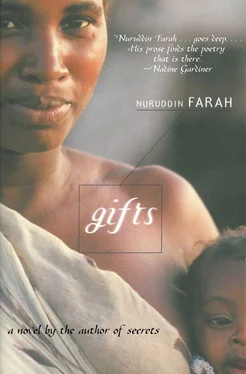Nuruddin Farah - Gifts
Здесь есть возможность читать онлайн «Nuruddin Farah - Gifts» весь текст электронной книги совершенно бесплатно (целиком полную версию без сокращений). В некоторых случаях можно слушать аудио, скачать через торрент в формате fb2 и присутствует краткое содержание. Год выпуска: 2011, Издательство: Arcade Publishing, Жанр: Современная проза, на английском языке. Описание произведения, (предисловие) а так же отзывы посетителей доступны на портале библиотеки ЛибКат.
- Название:Gifts
- Автор:
- Издательство:Arcade Publishing
- Жанр:
- Год:2011
- ISBN:нет данных
- Рейтинг книги:3 / 5. Голосов: 1
-
Избранное:Добавить в избранное
- Отзывы:
-
Ваша оценка:
- 60
- 1
- 2
- 3
- 4
- 5
Gifts: краткое содержание, описание и аннотация
Предлагаем к чтению аннотацию, описание, краткое содержание или предисловие (зависит от того, что написал сам автор книги «Gifts»). Если вы не нашли необходимую информацию о книге — напишите в комментариях, мы постараемся отыскать её.
Gifts — читать онлайн бесплатно полную книгу (весь текст) целиком
Ниже представлен текст книги, разбитый по страницам. Система сохранения места последней прочитанной страницы, позволяет с удобством читать онлайн бесплатно книгу «Gifts», без необходимости каждый раз заново искать на чём Вы остановились. Поставьте закладку, и сможете в любой момент перейти на страницу, на которой закончили чтение.
Интервал:
Закладка:
“What does all this mean, in plain language?” Duniya asked.
“It means,” Mire said, “that, on the surface of it at least, you invest your efforts in your daily activities of self-worship (in Judaeo-Christian as well as Islamic systems God is recreated in the image of man elevated to a higher plane, whereas in Somali thought, crows are unlike man’s idea of himself), and are promised heavenly dividends worthy of your trust in a god who gives and takes away life.”
“God gives, man gives!” Bosaaso said, not sounding very serious.
And silence fell It had become obvious to Mire that he was not making sense to Duniya, who appeared to have given up listening to his theorizations. It was time for the fruit salad.
When they had finished their dessert and the espresso coffee had been served, Duniya vanished into the bathroom for a while, in need of the quiet that comes of being alone in a room with a door to lock She also thought the two friends would appreciate a few moments to themselves in which they could lapse into their masculine idiom. In fact she had the feeling that they were like two people forced to speak in a foreign language for the benefit of a third person. After almost a whole evening of it she decided to give them a little time in which to speak in their own tongue.
From the bathroom and without undue effort Duniya was able to hear their conversation, the first half of which was mainly about the foundling, that he had not as yet been given his inoculations or a name. Bosaaso answered Mire’s questions with apparent reserve, mumbling some of his responses. At one point Mire asked, “Tell me, why are you keeping him, the two of you, I mean?”
“Who said we are keeping him?” Bosaaso replied.
“Aren’t you?” said a puzzled Mire.
“I have the impression,” explained Bosaaso, “that he is keeping us, in the sense of cementing my and Duniya’s friendship and strengthening it, day by day, minute by minute.”
“In what way?”
“The foundling has become the principal focus of our worries and pleasures, the central focus of our affections. We take care of him as though he were our own flesh and blood.”
“So what does that mean to you?” Mire asked.
“I can only speak for myself, because Duniya and I haven’t discussed this aspect of our relationship.”
“What does he mean to you personally then?”
“Until our relationship is more solid,” said Bosaaso, “and maybe even after that, the foundling will have been the symbol of our being together.”
“I’m not sure I’m with you,” Mire said.
“Look at it this way: he has been the central activity for her, me and for her children with whom I get on very well.”
“So you foresee a day soon when your relationship will take off so to speak, with no help from the foundling?” asked Mire cautiously.
“Especially now that Abshir is coming.”
“Why is that?”
Voice low, Bosaaso said, “Can we talk about it another time?”
“I see what you mean,” said Mire.
They fell silent.
Joining them, Duniya was given a tour of the flat. She was taken to Mire’s workroom, which felt quite like a hermit’s, a place where ideas were developed and where minds grew There was a chaos of books, piles and piles of them, heaped upon one another on tables, spilling off the edges of a bookcase Whereas Bosaaso had acquired two vehicles, one to give to his cousin as a taxi, the other for his own use, and in addition to a two-storey house for himself, another house for his community of cousins — Mire had invested his wealth in the acquisition of knowledge.
The workroom had its own comforts. There was a huge reclining chair, a custom-built chaise-longue, with inscriptions in German (Bosaaso explained that it was a gift from Claudia, Mire’s German woman-friend). There were lots of undusted comers in this room, and a number of half-drunk cups of coffee lying uncollected where they had been forgotten a day or so before. For Mire, Bosaaso said, the world outside his workroom had to be orderly, but not here. He couldn’t impose order on the growth of ideas. Here he was a human being; here he was not embarrassed by his own emotions.
He was private here too. There was a life-size photograph of Claudia Christ, his German woman-friend, overseeing everything in the workroom, from the vantage point where the portrait hung, high enough and in a way Duniya felt the European woman was looking into the mind of whoever stood anywhere in the room. The woman had thin lips, short hair, a tiny nose, projecting chin and prominent jaws. She made Duniya feel as if one were visiting a shrine.
Bosaaso served as her guide. He showed her translations into Somali of great European classics, including Shakespeare, Goethe and Dante, of which Mire had done drafts, with notes and introductions, each of them dedicated to Claudia. Mire translated directly from the originals, languages with which he was familiar. One day he hoped to publish this work of a lifetime.
He also pointed out Claudia Christ’s books, four of them, all in the original German and dedicated to Mire. Very noble of the woman to devote her life’s work to a man who hadn’t married her, not yet, thought Duniya.
The tour ended, she thanked Mire for a most pleasant evening and requested that she be taken home. As she left, she wondered how she was going to return Mire’s invitation. She would have to find a way of having him come for a meal at her place when it wasn’t crowded with noisy children. Her brother’s arrival would serve as a good pretext. “You must come for a meal when Abshir is here,” she said.
Eyes mischievous, Mire replied. “I hope for more than a mere meal.”
Bosaaso and Duniya were silent all the way to her place, where they noticed coming and going. Duniya didn’t encourage him to enter the house. They said their goodbyes outside. She got out of the car, but not before giving him a light kiss.
“See you tomorrow,” he said.
“Good night and thanks for everything,” she replied.
MOGADISCIO (SONNA, ANSA, 7 JANUARY)
An Italian government Aid Protocol was signed the day before yesterday at a reception held at Caruuba Hotel, Mogadiscio. The aid package has many applications to a number of development-related areas, ranging from the rehabilitation of rice-farming in Jowhar and environs, the extending of the capacity of beds of several general hospitals throughout the Republic, as well as the strengthening of relations between the two countries.
In this connection the Italian government has promised to increase the number of professors on secondment from Italian institutions of higher learning to the National University of Somalia. The Somali university is the only one outside Italy where all subjects are taught in Italian. As part of this programme, Italian scholars of Somali are helping their counterparts to complete an Italian-Somali dictionary and a linguistics project on which the team has been engaged, under the supervision of the University of Rome and of the Somali Language and Literature Academy.
The Protocol was signed by the Secretary of Foreign Affairs on behalf of Somalia and on behalf of Italy by its Charge d’Affaires.
10
In which Duniya and her three children play host to a number of visitors, including Muraayo. And as usual Bosaaso calls.
The morning was silver bright and a slight chill had blown into the room together with a dragon-fly which in fidgety movements up and down seemed to write a name in code. To read this, Duniya wiped away dewy humidity from her eyes, unsure of the result at first. The baby stirred on account of the cold wind in the Women’s Room and Duniya got out of bed to cover him with one of her guntiino-robes. When this proved insufficient, she picked him up and held him in the warmth of her embrace, cooing until he ceased to howl. She put him back in his cot and, having closed the window, returned to her bed.
Читать дальшеИнтервал:
Закладка:
Похожие книги на «Gifts»
Представляем Вашему вниманию похожие книги на «Gifts» списком для выбора. Мы отобрали схожую по названию и смыслу литературу в надежде предоставить читателям больше вариантов отыскать новые, интересные, ещё непрочитанные произведения.
Обсуждение, отзывы о книге «Gifts» и просто собственные мнения читателей. Оставьте ваши комментарии, напишите, что Вы думаете о произведении, его смысле или главных героях. Укажите что конкретно понравилось, а что нет, и почему Вы так считаете.











